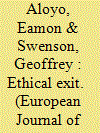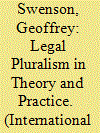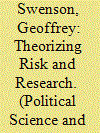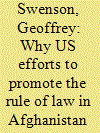|
|
|
Sort Order |
|
|
|
Items / Page
|
|
|
|
|
|
|
| Srl | Item |
| 1 |
ID:
190699


|
|
|
|
|
| Summary/Abstract |
When should peacekeepers partially or fully withdraw from a country or region in which they are operating? This important question has received little scholarly attention. However, it has profound implications. If peacekeepers depart prematurely, as happened in Rwanda in 1994, the consequences can be disastrous with the potential to lead to widespread preventable deaths and human suffering. If they overstay, peacekeepers risk alienating the population they are seeking to protect and undercutting popular sovereignty at significant economic costs. Striking a balance, we propose a framework for just withdrawal that is both normatively compelling and empirically sound. It focuses on three aspects that are vital for understanding when peacekeepers can depart in an ethically justified manner: just cause, effectiveness, and legitimacy. By considering a number of objections, we also address critics who challenge the overarching premise of peacekeeping or might prefer different standards by which to suggest peacekeepers should stay or depart. Finally, we illustrate our argument with theoretical and empirical examples and a discussion of UN peacekeeping in East Timor.
|
|
|
|
|
|
|
|
|
|
|
|
|
|
|
|
| 2 |
ID:
161742


|
|
|
|
|
| Summary/Abstract |
Legal pluralism has vast policy and governance implications. In developing countries, for instance, non-state justice systems often handle most disputes and retain substantial autonomy and authority. Legal pluralism's importance, however, is rarely recognized and dramatically under theorized. This article advances scholarly understanding of legal pluralism both theoretically and empirically. It proposes a new typological framework for conceptualizing legal pluralism through four distinct archetypes – combative, competitive, cooperative, and complementary – to help clarify the range of relationships between state and non-state actors. It posits five main strategies used by domestic and international actors in attempts to influence the relationship between state and non-state justice systems: bridging, harmonization, incorporation, subsidization, and repression. As post-conflict situations are fluid and can feature a wide range of relationships between state and non-state actors, they are particularly instructive for showing how legal pluralism archetypes can be shifted over time. Case studies from Timor-Leste and Afghanistan highlight that selecting an appropriate policy is vital for achieving sustainable positive outcomes. Strategies that rely on large scale spending or even the use of substantial military force in isolation are unlikely to be successful. The most promising approaches are culturally intelligible and constructively engage non-state justice networks of authority and legitimacy to collectively advance the judicial state-building process. While the case studies focus on post-conflict states, the theory presented can help understand and improve efforts to promote the rule of law as well as good governance and development more broadly in all legally pluralist settings.
|
|
|
|
|
|
|
|
|
|
|
|
|
|
|
|
| 3 |
ID:
172699


|
|
|
|
|
| Summary/Abstract |
Conflict, postconflict settings, and other risky research sites are important with wide-ranging policy implications. Microlevel, field-based research lends critical insights to how conflicts work and the mechanisms behind macrolevel correlations that underpin quantitative political science. This article identifies how the risks associated with conflict and postconflict contexts influence researchers’ choices by theorizing the existence of distinct adaptive strategies. Specifically, researchers facing elevated risk generally manage it through three main strategies: outsourcing risk, avoiding risk, and internalizing risk. We argue that these strategies systematically shape and circumscribe outputs. We conclude by discussing how the relationship between risky fieldwork and what we know about conflict is poorly acknowledged. Thinking about how we manage risk should play a larger role in both our preparation for and interpretation of research, particularly in conflict and postconflict contexts.
|
|
|
|
|
|
|
|
|
|
|
|
|
|
|
|
| 4 |
ID:
153634


|
|
|
|
|
| Summary/Abstract |
Promoting the rule of law in Afghanistan has been a major U.S. foreign policy objective since the collapse of the Taliban regime in late 2001. Policymakers invested heavily in building a modern democratic state bound by the rule of law as a means to consolidate a liberal post-conflict order. Eventually, justice-sector support also became a cornerstone of counterinsurgency efforts against the reconstituted Taliban. Yet a systematic analysis of the major U.S.-backed initiatives from 2004 to 2014 finds that assistance was consistently based on dubious assumptions and questionable strategic choices. These programs failed to advance the rule of law even as spending increased dramatically during President Barack Obama's administration. Aid helped enable rent seeking and a culture of impunity among Afghan state officials. Despite widespread claims to the contrary, rule-of-law initiatives did not bolster counterinsurgency efforts. The U.S. experience in Afghanistan highlights that effective rule-of-law aid cannot be merely technocratic. To have a reasonable prospect of success, rule-of-law promotion efforts must engage with the local foundations of legitimate legal order, which are often rooted in nonstate authority, and enjoy the support of credible domestic partners, including high-level state officials.
|
|
|
|
|
|
|
|
|
|
|
|
|
|
|
|
|
|
|
|
|